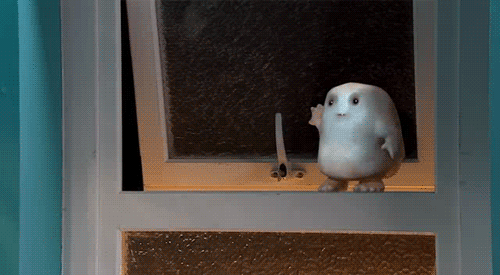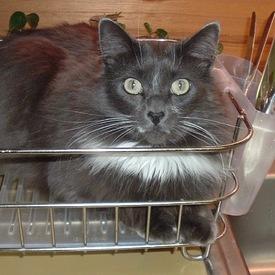Where does the fat go that you lost?
Replies
-
Body fat: What happens to lost fat?
When you lose weight, where does the lost body fat go?
Answer
from Katherine Zeratsky, R.D., L.D.
Body fat breaks down during a series of complex metabolic processes.
When you burn more calories than you consume, your body uses fat (triglycerides) for energy. This causes your fat cells to shrink. In turn, triglycerides are broken down into two different substances — glycerol and fatty acids — which are absorbed into your liver, kidneys and muscle tissue. From there, the glycerol and fatty acids are further broken down by chemical processes that ultimately produce energy for your body.
These activities generate heat, which helps maintain your body temperature. The resulting waste products — water and carbon dioxide — are excreted in urine and sweat or exhaled from your lungs....From the Mayo clinic web site and it is loaded with weight loss info...http://www.mayoclinic.com/health/weight-loss/MY00432/TAB=expertanswers....Copy & paste
Another excellent explaination! Thank you. Lol, i could have googled it myself but i figured others had the same question. Yay to MFP nerds!!0 -
You are all so wrong. It turns into adorable little alien creatures and walks away during the night.0
-
I had not thought of that (perhaps because my skin & hair are very "dry"). But of course I should have - it makes perfect sense.We also express fat as oils in our skin, hair etc...
Knowing that it's helping me lose weight will make me look forward to things like cleaning out my earwax. :happy:
[/quote]
....we lose moisture through expiration and perspiration... small amounts but still important to remember.
[/quote]
I think I had made a deliberate assumption that those amounts were small enough to neglect - and then went and forgot to say so anywhere (oops! ).
One thing that I've noticed is that when I exercise until I'm sweating like a stevedore, and then go shower all that sweat off, my skin feels cleaner and better than almost any other time. I wonder if driving all those oils & toxins & sweat molecules out through my pores is an especially good way to clean them (or something . 0
. 0 -
great info!0
-
You are all so wrong. It turns into adorable little alien creatures and walks away during the night.
 0
0 -
You are all so wrong. It turns into adorable little alien creatures and walks away during the night.
adipose!!!0 -
You are so cool! I love people who understand what is really going on! Brains are so SEXY! OMG!
Hey, baby - come on over to my place and I'll show you my mass balance calculations... 0
0 -
the fat you lose goes to my *kitten* when I'm sleeping. STOP IT!0
-
I GUESS MAYBE BIOLOGY WAS NOT MY FAVORITE CLASS, MY GRANNY TOLD ME TO EAT ALL MY VEGGIES!, SO THAT IT CAN HELP ME THE CORRECT WAY TO LEAN TOWARDS A LONGER LIFE ( WHAT THAT MEANS AS AN ADULT ) VEGGIES SEND YOU TO THE BATHROOM WHERE WE FLUSH THE ADDED FATS!!!!0
-
I did not just google your question I have been on the Mayo-clinic for a while doing research on how I lose weight I want to know this stuff for 2 reasons 1 knowledge is power 2 because the huge amount of mis-information on these boards it helps when people ask stupid questions like thisBody fat: What happens to lost fat?
When you lose weight, where does the lost body fat go?
Answer
from Katherine Zeratsky, R.D., L.D.
Body fat breaks down during a series of complex metabolic processes.
When you burn more calories than you consume, your body uses fat (triglycerides) for energy. This causes your fat cells to shrink. In turn, triglycerides are broken down into two different substances — glycerol and fatty acids — which are absorbed into your liver, kidneys and muscle tissue. From there, the glycerol and fatty acids are further broken down by chemical processes that ultimately produce energy for your body.
These activities generate heat, which helps maintain your body temperature. The resulting waste products — water and carbon dioxide — are excreted in urine and sweat or exhaled from your lungs....From the Mayo clinic web site and it is loaded with weight loss info...http://www.mayoclinic.com/health/weight-loss/MY00432/TAB=expertanswers....Copy & paste
Another excellent explaination! Thank you. Lol, i could have googled it myself but i figured others had the same question. Yay to MFP nerds!!0 -
Okay. so if I'm understanding this right:Body fat: What happens to lost fat?
When you lose weight, where does the lost body fat go?
Answer
from Katherine Zeratsky, R.D., L.D.
Body fat breaks down during a series of complex metabolic processes.
When you burn more calories than you consume, your body uses fat (triglycerides) for energy. This causes your fat cells to shrink. In turn, triglycerides are broken down into two different substances — glycerol and fatty acids — which are absorbed into your liver, kidneys and muscle tissue. From there, the glycerol and fatty acids are further broken down by chemical processes that ultimately produce energy for your body.
These activities generate heat, which helps maintain your body temperature. The resulting waste products — water and carbon dioxide — are excreted in urine and sweat or exhaled from your lungs....From the Mayo clinic web site and it is loaded with weight loss info...http://www.mayoclinic.com/health/weight-loss/MY00432/TAB=expertanswers....Copy & paste
The fat on my body is made of of adipose tissue, which is made of lipoproteins (are those the same HDLs and LDLs that turn up in my cholesterol tests results?).
Lipoprotein molecules are long carbon chains with lots of hydrogen bonds, somewhat fewer oxygen bonds, and the odd toxin or hormone stuck in here and there.
When that fat is burned, the lipoprotiens undergo a chemical reaction something like:
Long carbon chain lipoprotein molecule => CO2 + H2O + a smaller amount of other stuff
The chemical bonds in the lipoprotein molecule held more energy than the chemical bonds in the carbon dioxide and the water (and the other stuff), and that difference is the energy that I'm using to exercise (or whatever it is I'm doing).
Most of the CO2 leaves my body on my breath; and the H2O leaves my body as the moisture in my breath, as urine, as sweat, and as other bodily fluids not named here.
The "other stuff" leaves by the aforementioned routes, with the oil on my skin & hair, with my poop, or maybe a couple of other ways I'm not thinking of.
Is that about right?0 -
This has been bothering me for a long time so thanks for the clarity
 0
0 -
It is atomically transferred to the closest person next to you that is not watching their calories or exercising.0
-
That information is classified by the federal government. You do not have proper clearance for that information.
Actually, it's MAGIC! TaDaaa!!!
I thought it got used to make soap. Oops, was I not authorized to know that information?0 -
You are so cool! I love people who understand what is really going on! Brains are so SEXY! OMG!
Hey, baby - come on over to my place and I'll show you my mass balance calculations...
Do you have a slide rule? 0
0 -
That information is classified by the federal government. You do not have proper clearance for that information.
Actually, it's MAGIC! TaDaaa!!!
Why is the government trying to hide the magic? :sad:0 -
You breathe it out.
Dead serious.
Read here: http://en.m.wikipedia.org/wiki/User:Znode/Misc/The_Physics_of_Losing_Weight0 -
I'd just like to throw it out there that when you gain fat, you create fat cells. These cells do not disappearwhen you lose weight, they just shrink. The presence of these cells makes it easier to regain weight that you have lost.
That's seriously depressing, isn't it?0 -
At night it becomes one of these, and walks away.
 0
0 -
It ends up primarily as carbon dioxide and water, in a glorious combustion reaction, so yeah, you literally burn it.0
-
Anyone else have an "Ah Ha" moment? I did. Thanks for all the info.0
-
I dont't care.
as long as it is leaving that is good enough for me.0 -
it's converted into energy to help the function of your cells. Since it has been converted into energy in the form of water and carbon dioxide, it naturally leaves your body through your sweat glands as your body regulates its internal temperature, logically while you exhale carbon dioxide, and urine. Poop is more the byproduct of metabolism. All the junk your cells got rid of, goes out with poop.
Hope I explained it simple enough.0 -
that is so weird. i was just thinking that yesterday lol.
 0
0 -
And then you poo and pee it out. Let me clarify..then you poo and pee what's left out. I think that is where the water comes into play.It is being chemically changed into energy. It's burned for fuel. You've seen wood broken down by fire into ashes? Well, the heat generated is the energy. The ashes are the byproduct. The byproducts of fat metabolism are metabolites that are carried away through the kidneys and expelled in urine.
Then I must have burned down a couple of two huge pine trees lmao!!0 -
I thought it went into the sky and made clouds.0
-
what a great question - great post
 0
0 -
It is being chemically changed into energy. It's burned for fuel. You've seen wood broken down by fire into ashes? Well, the heat generated is the energy. The ashes are the byproduct. The byproducts of fat metabolism are metabolites that are carried away through the kidneys and expelled in urine.
This is a beautiful metaphor and explanation! I never understood where the fat goes as well - so thank you for this!0 -
The fat cells stay in your body unless you have them surgically removed. What happens when you "lose" fat is that they just shrink. I think you develop most of your lifetime fat cells by puberty. That's why it's sad for my to see fat kids. They are already starting out with a weight control handicap that thinner kids like me didn't have. It will probably always be a struggle for them because everyone's body has a set point at which it wants the fat cells to be a certain size. More fat cells at that size equals more fat. Sure, the extra fat cells can shrink, too, but it takes more vigilance to keep it all under control.0
-
Thanks for this post:happy: I have been wondering about this myself .0
This discussion has been closed.
Categories
- All Categories
- 1.4M Health, Wellness and Goals
- 398.4K Introduce Yourself
- 44.7K Getting Started
- 261K Health and Weight Loss
- 176.4K Food and Nutrition
- 47.7K Recipes
- 233K Fitness and Exercise
- 462 Sleep, Mindfulness and Overall Wellness
- 6.5K Goal: Maintaining Weight
- 8.7K Goal: Gaining Weight and Body Building
- 153.5K Motivation and Support
- 8.4K Challenges
- 1.4K Debate Club
- 96.5K Chit-Chat
- 2.6K Fun and Games
- 4.7K MyFitnessPal Information
- 17 News and Announcements
- 21 MyFitnessPal Academy
- 1.5K Feature Suggestions and Ideas
- 3.2K MyFitnessPal Tech Support Questions



















